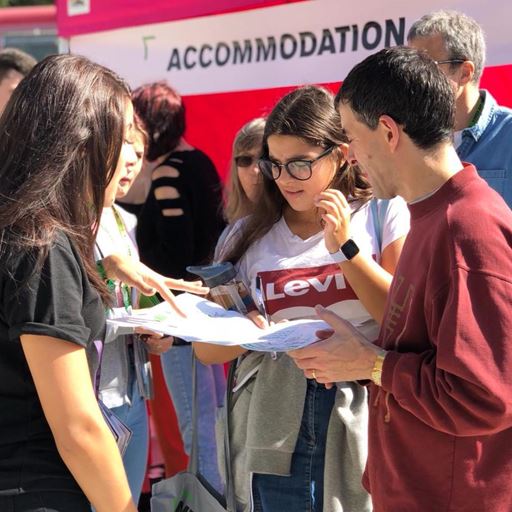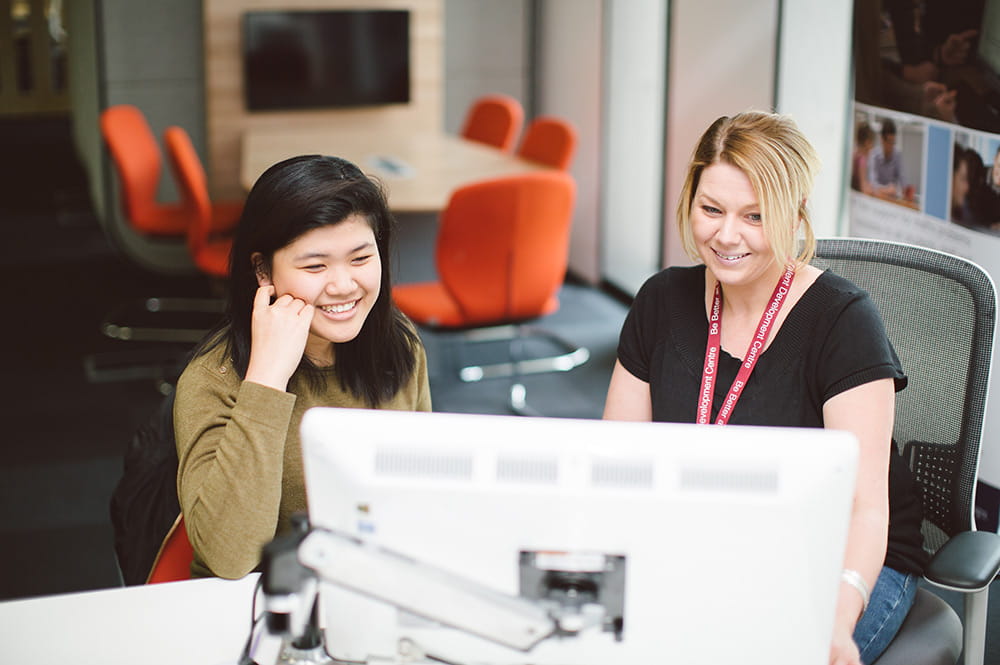Guiding you through the university application process
So, someone you care for is interested in going to university. Congratulations! Whilst it’s an exciting journey, opening the door to opportunity, personal growth and academic development, we appreciate it can also feel overwhelming – for them and you. As a parent or guardian you want to help guide your young person through this process.
Through this webpage and our parent-tailored emails we will equip you with the knowledge and understanding you need to not only help your young person through this process, but to also feel more comfortable yourself.
We recommend beginning your research during Spring time if you are planning on joining the University in October of the following year. You should ensure you explore all the courses available in as much detail as possible, as in many cases some University's may offer courses you might never have thought of before.
If you are applying through UCAS, applications can be submitted between September - January. Applying then, ensures your application will be given the best consideration by the University. If you miss this date, some University courses may close, but you can still submit your application and many courses will still be open and taking applications still.
Our 'how to apply' page provides all the information you might need to make your application and goes through the steps and considerations you might need to make.
Key dates around applying for University
- Start researching courses and universities.
- Attend Open Days and UCAS Exhibitions to get a feel for what universities have to offer.
- Sign up to UCAS Hub from May.
- Start planning your personal statement.
- Attend any final open days and decide which courses to apply for.
- Start to draft a personal statement and UCAS application.
- University applications can be made via UCAS or directly to the University of Essex.
- Universities will start making offers.
- The deadline for submitting UCAS applications for medicine, veterinary medicine or dentistry is mid-October.
- The deadline for submitting UCAS applications for most other courses is mid-January.
- Universities will continue to make offers.
- Attend an Offer Holder Day: visit the university and find out more about the course.
- Speak to current students on Unibuddy, to get a feel for student life.
- Attend an interview if the course requires one.
- UCAS Extra opens in late February.
- Apply for Student Finance from mid-March.
- Student Finance applications close at the end of May.
- Decide on a firm and insurance choice by early June.
- Start to apply for student accommodation.
- Clearing opens in early July for those who have their results already. Otherwise, wait until results are released.
- Exam results are released mid-August.
- Universities will confirm places once results are published; accept or go into Clearing.
- The deadline to apply for guaranteed student accommodation at Essex is early September.
- Check any Student Finance is in place in early September.
- Set up a university IT account, access departmental timetables and choose optional modules.
- Complete online pre-registration and pay tuition fees by mid-September.
- Complete in-person registration on arrival at university and become an official university student.
- University starts! Attend welcome week and start to settle into university life.

We all know the experience of your young person going to university is life changing for them, but what about you? Read about Melanie's experience and how she felt when daughter, Maddie, left the family home to come to Essex to study International Relations. Spoiler alert - it won't be as bad you think!
We know that students get the most out of their experience at university when they feel settled and supported. We also understand how nerve wracking this time can be for you as a parent or guardian of a young person starting university. To help appease these fears, here’s a round-up of some of the ways we ensure our students are supported and cared for during their time with us.
Mental health and wellbeing support
Our Wellbeing Assessors provide a welcoming and friendly space for your young person to talk through any challenges they may be facing. These sessions are short-term, designed to guide students to the next steps. For longer-term support, we provide referrals to external health and wellbeing services.
In addition, students can contact the 24-hour Student Wellbeing Support Line (0800 028 3766) and Togetherall, a digital peer support mental health platform, or download the Wisdom App. Students can also request counselling.
Supporting new students away from home
University may be your young person's first time living away from home, so they can benefit from our peer mentor scheme to meet others in their course or to help them join clubs and societies. If they are unsure who their peer mentor is, they can contact their Department or email peermentor@essex.ac.uk.
Making friends at university
Welcome Week is the perfect opportunity for your young person to immerse themselves in university life, meet new people, and form friendships from day one. Beyond classmates and roommates, students can join societies and clubs run by the Students' Union to meet others with similar interests.
Support for students with additional learning needs
When your young person applies to Essex, they can note any additional learning needs. Our Student Wellbeing and Inclusivity Service (SWIS) Team will contact them to offer tailored support in various areas, including financial, academic, and accommodation needs.
Support for Diabetic students
If your young person has diabetes, we offer a range of support options:
- For insulin storage, the accommodation team can provide a small fridge in their room.
- The on-campus health centre provides easy access to a GP.
- Monthly peer support groups bring together diabetic students, specialist nurses, and the local GP.
Colchester, where Essex is based, leads the country in diabetes data, ensuring top-quality care.
Support for students with physical disabilities
Students with physical disabilities will be assigned a named Accessibility and Wellbeing Advisor who offers personalized support and advice. Our Inclusion Learning Advisers provide study skills reviews and one-on-one tutorials. Each academic Department has a disability liaison officer to assist as well. A full range of online support is also available.
Campus security
Our Security Team in Colchester is available 24/7 to provide support, whether in person or over the phone. They handle security matters, lockouts, lost property, out-of-hours faults, and liaising with emergency services. On-campus accommodation is regularly patrolled by 24-hour security. Each accommodation site has a Security/Reception Office where students can contact security for any in-person issues.
The Security and Campus Safety Team are based on Square 3 of the Colchester Campus. They can be reached via email at patrol@essex.ac.uk or by phone at 01206 872125 / 873148 (for non-emergencies).

Finance, funding and financial support
One of the biggest concerns for both parents and students is the cost of going to University, but two things are definitely true: firstly, university is worth it – we provide our students with a transformational experience that will benefit them for the rest of their lives; and secondly, there’s loads of financial support available – many of our students have access to loans, bursaries, scholarships and discounts which will help them pay for their education at Essex.
Bursaries and scholarships available to support young people
- For UK students starting a three-year undergraduate course in 2025-2026 a support package of up to £3,000 is being offered to students with a household income of £35,000 or under (as assessed by Student Finance England).
- We also have some sports scholarships available for talented athletes playing at regional, national or international level in our focus sports.
- If your young person completes one of our online Essex Preparation Programmes before joining us at university, they will receive a £250 cash bursary.
- There are plenty of other bursaries and scholarships available to support your young person, ensuring students can come to us no matter what their background or financial status is.
Government loans to support young people at university
Undergraduate students from the UK are entitled to apply for a Government-backed loan to cover their tuition fees and living expenses for the duration of their studies with us.
- The tuition fee loan covers the full course fees. This is currently set at a maximum of £9,535 for all UK full-time undergraduate courses starting in the 2025-2026 academic year.
- The maintenance loan is designed to cover other living expenses, such as rent or accommodation, food, travel and study materials. The amount of maintenance loan that a student is eligible for depends on 2 factors: (1) their household income, and (2) where they plan to live and study during their course.
- They will only start to repay the loan in small increments after they’ve graduated, once their income is above a certain amount.
University support with the cost of living
Our Student Union is also here to provide a range of support and guidance to help students deal with their finances and the cost of living, including how to manage their money and more general support and guidance.

Student accommodation at Essex
For many parents, university is the first time your young person has moved out of the family home and we know you probably have a lot of queries about what living at university will be like for them.
On-Campus Accommodation Guarantee
All first-year students at our Colchester and Southend Campuses are guaranteed on-campus accommodation. This guarantee extends throughout the course for international students. While UK/Home students are not guaranteed on-campus housing beyond the first year, accommodation is available for the duration of their course.
Furnished rooms and kitchen amenities
All rooms are furnished with essential items such as a bed, desk, chair, and wardrobe. Students will need to bring their own bedding and any additional furnishings they require. Communal kitchens come equipped with a hob, oven, fridge, freezer, kettle, and microwave. Each flat also has access to an ironing board and vacuum cleaner for shared use.
No additional bills
Rent covers energy, water bills, internet access, contents insurance, 24/7 security, and support from our wellbeing teams. For Colchester Campus students, an Essex Sport gym membership is also included. However, a TV license is required if your young person intends to watch live TV or use BBC iPlayer, which is not included in the rent.
Cleaning of accommodation
Professional cleaners maintain communal areas, with the frequency of cleaning depending on the accommodation. Students are responsible for cleaning their own bedrooms and en-suites. Please note that communal cleaning is not available in the Pastures accommodation.
Accommodation for physically disabled students
We offer a range of adapted rooms to meet individual needs, including wheelchair access, hearing impairment accommodations, automated doors, and adapted shower rooms.
Staying with your young person on campus
Students are welcome to have a guest stay occasionally. Alternatively to staying with them, if you'd like to visit your young person, you can book accommodation through Event Essex for a comfortable stay on campus.
Changing accommodation
If your young person wishes to change accommodation, they can request to exchange rooms with another student or move to a vacant room when applications open in November each year.
Number of flatmates
The number of flatmates varies by accommodation type, ranging from 4 to 16 people. While your young person can note preferences in the 'additional notes' section of their accommodation application, we cannot guarantee a specific number of flatmates.
LGBTQ+ specific accommodation
We are committed to providing a safe and supportive environment for LGBTQ+ students, which is why we offer dedicated accommodation for those who identify as part of the LGBTQ+ community. Please note, LGBTQ+ accommodation is not available to allies.
Accommodation during holidays
Your young person's accommodation will remain theirs for the entire academic year, including the Christmas and Easter breaks. They do not need to empty their room during these holidays. Additionally, summer vacation bookings are available.

Careers and Employability Support
One of the big benefits of going to university is the prospect of getting a graduate-level job once students have completed their degree – and this is no different at Essex. We focus on helping students improve their employability by gaining new skills and having new experiences during their time with us.
Career options after studying
Often, students will know what they want to study but you and they might have questions about what type of career their course might lead to. Our course pages have details about different careers available after graduating.
Careers support available at Essex
Your young person will benefit from the support of our student careers service who will provide advice and guidance on how to develop a career plan, write a CV and find a job. We also offer career mentoring programmes for students, so they can learn from the experience of others who can guide and help students make the right decisions.
Part time jobs
We have a wide range of jobs and internships available at Essex, and we have expanded the jobs available on campus to support students with their university living costs. All of our on-campus jobs are paid at least the Voluntary Living Wage, to support your young person during your time with us.
Boosting your young person’s career prospects
If your young person wants to gain work experience in a particular sector, they can add a work placement to their degree, or they can choose to study, work or volunteer abroad. Students can also choose from a range of extra-curricular learning opportunities, such as learning a new language or data science skills.
Essex Startups is also available to provide training, support and funding opportunities to any students who are wanting to start their own business.
Careers support available for life
All of our graduates can continue to access careers support for life! Support available includes one to one support for updating CVs, job hunting and making job applications, as well as tailored events, online resources and start-up support for businesses.









